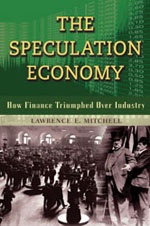
A historical look at U.S. business explains much about today’s economic issues, says professor Lawrence Mitchell
in his latest book.
By Kathleen Kocks
The performance of the U.S. stock market is constant headline news.
With millions of Americans pumping billions of dollars into the market, people understandably want to hear how their money is doing. It’s not just the rich but also the common men and women who are increasingly banking their retirements on the market’s performance via IRAs or 401Ks. It’s also of great import to company managers whose compensation increasingly includes stock.
 The Speculation Economy
The Speculation Economy was named best business book of the year by ForeWord magazine.
This obsession with the market calls to mind the words of the French philosopher Voltaire: “When it is a question of money, everybody is of the same religion.” And what this congregation wants to see is positive results.
Yet this microscopic focus on stock prices is unhealthy, according to many business experts. Among them is Lawrence E. Mitchell, GW’s Theodore Rinehart Professor of Business Law, who has written two books on the role the stock market has played in shaping American businesses.
The first, Corporate Irresponsibility: America’s Newest Export (Yale University Press, 2001), describes how corporations are so focused on making short-term profits that they are adversely affecting the long-term health of their corporations as well as their employees, the economy, the environment, and American politics.
Mitchell’s newest book builds on that research. The Speculation Economy: How Finance Triumphed Over Industry (Berrett-Koehler Publishers, 2007) provides a historical account of how the American stock market evolved and further develops many of the points he made in Corporate Irresponsibility.
“When I wrote Corporate Irresponsibility, I identified the most significant contemporary business problem as being the dominance of the stock market in American businesses,” Mitchell says. “This has caused a short-term frame of mind among businessmen and has led to potential destructive changes in managerial practices.”
In a nutshell, Mitchell says we’ve come to a point where the price of the stock has taken on more importance than what a company produces. As a result, companies are scrimping on production or research and development investments as they seek ways to maximize profit and keep their stock prices high.
It’s this kind of environment that breeds financial scandals like WorldCom and Enron, where company managers faked the corporation’s financial reports to keep stock prices high.
Mitchell believes the push for stock price profit also has played a role in the current subprime market mortgage crisis. In this case, loans were made to individuals with less-than-stellar credit and then sold as mortgage-backed securities to millions of eager stock market players. These already higher-risk securities were doomed to crash when interest rates climbed, the housing bubble deflated, and financially wobbly mortgagors could no longer pay loans and defaulted.
In Corporate Irresponsibility, Mitchell detailed the drawbacks of the market and suggested ways to correct problems. After the book’s publishing, he began to ponder further questions: How did all this come to pass? When did the focus of our companies move from production of goods and services to, effectively, the production of stock?
The Speculation Economy, in turn, investigates how business got to this point.
A Look Back
“I began to research the history, looking at records of the old Federal Bureau of Corporations and the decades of early legislation involving federal incorporation and antitrust reform. A picture began to emerge,” Mitchell explains.
The Speculation Economy clearly portrays that picture by weaving together the many facets that impacted American business from the final decade of the 1800s until 1920.
The book delivers a detailed explanation of how American companies transformed from being privately owned entities, with stock closely held by founders, their family, friends, or business associates, into giant publicly traded corporations. It highlights how the emergence of fierce predatory competition among businesses served as a catalyst for companies to join together and cooperate in order to survive. It describes how the cooperative movement gave birth to the legendary trusts as well as many monopolies and all their perceived evils.
The Speculation Economy also traces how government and politics were transformed into powerful institutions that regulated business. It follows the steps the federal government took to move from a laissez faire attitude toward business to one that attacked and broke down monopolistic trusts with antitrust regulation. The era also created the need for securities regulation that was carefully crafted to protect investors but not restrict free trade.
Readers also learn the role states’ rights played in this transformation, with the state of New Jersey blazing the path. Mitchell tells the story of how a clever attorney crafted a revolutionary law that didn’t create a trust, per se, but allowed any number of companies to be joined through a holding company. This ploy enabled the creation of the modern giant American corporation, as well as the modern stock market, because the law allowed the holding company to issue and sell stock in the corporation.
Mitchell also describes how promoters aggressively created and sold stock in the new corporations, offering shares in common stock and transforming the stock market from a venue for the privileged few into a market for the masses. He explains how banks and other financial institutions were so eager to capture this mass market that they created installment programs; people were given credit to pay for stock purchases over a longer term—along with interest charges for the “privilege.”
As Mitchell unfolds the history of early stock market buying and selling, readers begin to appreciate how difficult it was for investors as well as regulators to define the worth of corporations—and whether their stock was worth the selling price. There were no standard accounting procedures for many aspects of the new entities, and the infant science of finance was anything but scientific.
The book shows how Americans transitioned from mainly investing conservatively—buying bonds or preferred stock—into market players favoring common stock. Though far more risky, such investment had the potential for much more profit. The book also illustrates how ordinary Americans began purchasing common stock to build wealth rather than securing their futures through land ownership or their own businesses as their parents and grandparents had.
All these activities, Mitchell shows, resulted in Americans by the tens of thousands “moving from anticipating income to gambling for capital gain,” which has led to today’s “speculation economy.” The investors are willing to “speculate” with common stock, rather than invest in an ensured rate of return that may be far less lucrative.
The availability of common stock also bred a new kind of American capitalist, Mitchell explains. Gone were the capitalists who invested in companies to promote the products and thus the profits of their businesses; in their place were capitalists who invested in companies for the purpose of making profits from stock, that is: “for the sake of finance.”
And finally, the book contains behind-the-scenes stories of some leaders and newsmakers of the time, giving insight into the genius of legal minds, the hidden agendas of presidents, and the aggressive maneuvers of industrial tyrants.
Mitchell ends his book as the year 1920 rolls in. Although that decade brought the stock market crash of 1929, Mitchell saw no need to continue the story. By 1919, the gel was set as stockholder demands and expectations gained the upper hand in the American economy. As the book’s title says—finance had triumphed over industry.
A Resolution?
This look at business history shows that the relationship between productive industry and capital markets was broken from the beginning, Mitchell says. When asked if there is a way to chart a new course, Mitchell offers suggestions.
“Further regulation is one answer, and there are ways to regulate businesses without heavy regulation, but rather to regulate in a way that changes incentives so that businesses behave as if the long term matters,” he says.
“I believe we could also mitigate our problems by changing the capital gains tax laws, to encourage shareholders to hold onto stocks for longer periods of time. Other ways might be to reduce the frequency of financial reporting to something longer than every quarter, to extend the terms of directors, or to work with accounting methods to make more meaningful distinctions between assets and expenses. As an example of the latter, why can’t companies count employees as assets, rather than liabilities?”
Otherwise, he says, capital markets will continue to dominate.
At a Glance: Lawrence E. Mitchell
 Claire Duggan
Claire Duggan
An expert in progressive corporate law and a champion for ethics, corporate governance, and social and economic justice within the law, Lawrence E. Mitchell is GW’s Theodore Rinehart Professor of Business Law and the director of the University’s Institute for International Corporate Governance & Accountability, which he founded in 2000. He also created and directs GW’s Sloan Program for the Study of Business in Society.
With a law degree from Columbia University, he began his teaching career at GW in 1991 after several years of private practice in New York, most recently at Paul, Weiss, Rifkind, Wharton & Garrison, where he engaged in a broad-based financial practice.
Mitchell’s writings often tackle the legal profession’s responsibilities to address complex social issues. This point is illustrated in the casebooks he has co-authored and in the three books he has independently written.
In addition to publishing The Speculation Economy this past fall, Mitchell published Stacked Deck: A Story of Selfishness in America in 1998. The book was a philosophical study of fairness and vulnerability in our society. In it, Mitchell suggests that humans instinctively have a desire to help people who are vulnerable, such as children, the elderly, or the poor. He argues that today’s large society inhibits those desires because the fortunate are effectively segregated from the unfortunate and do not see their vulnerabilities. As a result, many public policies don’t address the needs of the vulnerable—leading to a “selfish” society that neglects the vulnerable and perpetrates their status quo.
His second book, Corporate Irresponsibility: America’s Newest Export, extends to corporations the theme of neglect of “the common good.” It argues how obsession with stock market prices and generating profit is harming the long-term economy as well as other aspects of society.
Along with writing books, Mitchell teaches what he preaches to GW students.
“Like other GW professors, I teach my students how to read and think critically,” he says. “But the key point I really want to impress upon them is to never lose sight of the humanity of their discipline and the vulnerability of the people they will be helping.” |
|